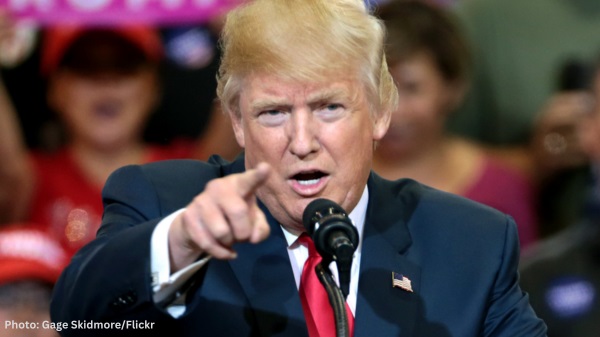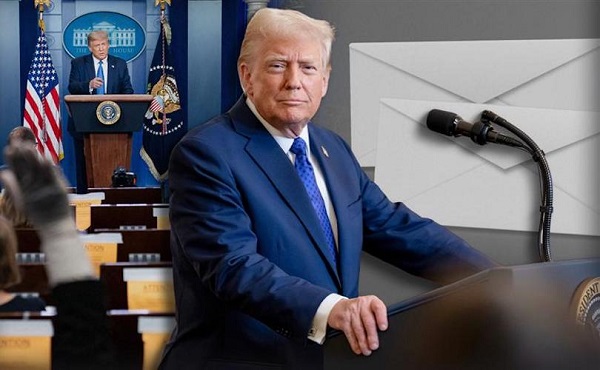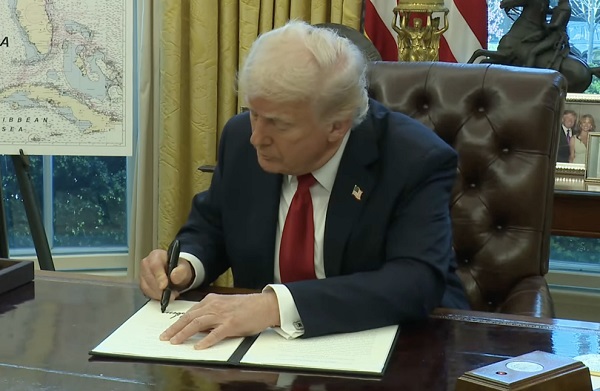International
‘Really, Really Difficult’: Bureaucrats Worry Behind Closed Doors They’ll Be Sent Packing Under Trump

From Heartland Daily News
“He’s going to get people in place that are more intelligent and are more loyal to him,” a park service employee said. “Now I think he could do a lot of damage.”
Government workers are reportedly in a state of panic over the prospect of former President Donald Trump winning another term in office, according to E&E News.
Bureaucrats up and down the federal hierarchy are concerned that a second Trump administration could cost them their jobs and put an end to liberal programs they worked to implement under President Joe Biden, E&E News reported. Trump has, if elected, pledged to implement reforms that would allow him to fire up to 50,000 civil servants at will, with the former president singling out workers who are incompetent, unnecessary or undermine his democratic mandate.
“The first rendition of the Trump administration was really, really difficult, and we saw a mass exodus of employees retiring,” a National Park Service employee told E&E News. “If we do have an administration shift, other employees will also reconsider their positions and move to the private sector. I don’t know what I’ll end up doing.”
Of the civil servants that didn’t exit during Trump’s first term, many worked internally to deliberately obstruct his agenda, according to Miles Taylor, who served as chief of staff in the Department of Homeland Security from 2017 to 2019 and admitted to engaging in such behavior. Bureaucrats are worried that Trump may seek to appoint administrators who agree with his agenda this time around.
“He’s going to get people in place that are more intelligent and are more loyal to him,” a park service employee said. “Now I think he could do a lot of damage.”
To replace large numbers of federal employees, Trump would reclassify them as Schedule F employees, allowing him to fire them at will. The Biden administration finalized a rule in April that would prevent their status from being changed involuntarily, however, allies of the former president have shrugged off the rule by pointing out that a Trump administration could simply reverse it, according to The New York Times.
Amid fear that Trump’s plans may come to fruition, bureaucrats are making moves to ensure the Biden administration’s policies are as hard to repeal as possible, a senior employee at the Interior Department told E&E News.
“The concern hasn’t been focused on who the Democratic nominee is as much as concerns about Trump winning and what that would mean,” they said. “From everyone’s perspective it is get as much done as possible. Also trying to bury into the agency programs [like environmental justice] so they can survive a Trump administration.”
Conservatives are increasingly optimistic about Trump’s chances of defeating Biden in November as the president lags behind Trump in the polls and the Democratic Party grapples with internal disputes regarding whether or not he should be their nominee.
“The mood is somber and incredulous,” one long-time employee of the Department of the Interior told E&E News. “The hope is we will not suffer through another term with the prior leadership, but the fear [is] that if we do, they will target employees they don’t like, make things up to justify whatever punishment they want and just cripple the good work we are doing.”
Staff at the Environmental Protection Agency (EPA), meanwhile, are also upset and agitated, the president of a union representing some of the agency’s employees told E&E News. “So many of our members lived through the absolutely disastrous first Trump administration and his attempted dismantling of EPA,” she said.
Originally published by The Daily Caller. Republished with permission.
Daily Caller
AI Needs Natural Gas To Survive


From the Daily Caller News Foundation
By David Blackmon
As recent studies project a big rise in power generation demand from the big datacenters that are proliferating around the United States, the big question continues to focus in on what forms of generation will rise to meet the new demand. Most datacenters have plans to initially interconnect into local power grids, but the sheer magnitude of their energy needs threatens to outstrip the ability of grid managers to expand supply fast enough.
This hunger for more affordable, 24/7 baseload capacity is leading to a variety of proposed solutions, including President Donald Trump’s new executive orders focused on reviving the nation’s coal industry, scheduled to be signed Tuesday afternoon. But efforts to restart the permitting of new coal-fired power plants in the US will require additional policy changes, efforts which will take time and could ultimately fail. In the meantime, datacenter developers find themselves having to delay construction and completion dates until firm power supply can be secured.
Datacenters specific to AI technology require ever-increasing power loads. For instance, a single AI query can consume nearly ten times the power of a traditional internet search, and projections suggest that U.S. data center electricity consumption could double or even triple by 2030, rising from about 4-5% of total U.S. electricity today to as much as 9-12%. Globally, data centers could see usage climb from around 536 terawatt-hours (TWh) in 2025 to over 1,000 TWh by 2030. In January, a report from the American Security Project estimated that datacenters could consume about 12% of all U.S. power supply.
Obviously, the situation calls for innovative solutions. A pair of big players in the natural gas industry, Liberty Energy and Range Resources, announced on April 8 plans to diversify into the power generation business with the development of a major new natural gas power plant to be located in the Pittsburgh area. Partnering with Imperial Land Corporation (ILC), Liberty and Range will locate the major power generation plant in the Fort Cherry Development District, a Class A industrial park being developed by ILC.
“The strategic collaboration between Liberty, ILC, and Range will focus on a dedicated power generation facility tailored to meet the energy demands of data centers, industrial facilities, and other high-energy-use businesses in Pennsylvania,” the companies said in a joint release.
Plans for this new natural gas power project follows closely on the heels of the March 22 announcement for plans to transform the largest coal-fired power plant in Pennsylvania, the Homer City generating station, into a new gas-fired facility. The planned revitalized plant would house 7 natural gas turbines with a combined capacity of 4.5 GW, enough power 3 million homes.
Both the Homer City station and the Fort Cherry plant will use gas produced out of the Appalachia region’s massive Marcellus Shale formation, the most prolific gas basin in North America. But plans like these by gas companies to invest in their own products for power needs aren’t isolated to Pennsylvania.
In late January, big Permian Basin oil and gas producer Diamondback Energy told investors that it is seeking equity partners to develop a major gas-fired plan on its own acreage in the region. The facility would primarily supply electricity to data centers, which are expected to proliferate in Texas due to the AI boom, while also providing power for Diamondback’s own field operations. This dual-purpose approach could lower the company’s power costs and create a new revenue stream by selling excess electricity.
Prospects for expansion of gas generation in the U.S. received a big boost in January when GE Vernova announced plans for a $600 million expansion of its manufacturing capacity for gas turbines and other products in the U.S. GE Vernova is the main supplier of turbines for U.S. power generation needs. The company plans to build 37 gas power turbines in 2025, with a potential increase to over 70 by 2027, to meet rising energy demands.
The bottom line on these and other recent events is this: Natural gas is quickly becoming the power generation fuel of choice to feed the needs of the expanding datacenter industry through 2035, and potentially beyond. Given that reality, the smart thing to do for these and other companies in the natural gas business is to put down big bets on themselves.
David Blackmon is an energy writer and consultant based in Texas. He spent 40 years in the oil and gas business, where he specialized in public policy and communications.
International
Trump White House will ignore reporter emails that include ‘preferred pronouns’ in signature

From LifeSiteNews
“Any reporter who chooses to put their preferred pronouns in their bio clearly does not care about biological reality or truth and therefore cannot be trusted to write an honest story”
The White House will ignore all emails from reporters which include preferred gender pronouns in their email signatures according to Press Secretary Karoline Leavitt.
“Any reporter who chooses to put their preferred pronouns in their bio clearly does not care about biological reality or truth and therefore cannot be trusted to write an honest story,” Leavitt wrote in response to a request for comment from the New York Times.
The practice of citing one’s preferred gender pronouns, which is increasingly prevalent among leftists, stems from gender ideology, the idea that people have a “gender identity” that is distinct from their sex. Thus, for example, women who identify as males may include the gender pronouns “he/him” in their email signature or other identifiers.
Leavitt had previously stated to a NYT reporter who inquired about the potential closure of a climate research observatory, “As a matter of policy, we do not respond to reporters with pronouns in their bios.”
The New York Times reported that Katie Miller, senior advisor for the Department Of Government Efficiency (DOGE), had weeks prior declined another question from a Times reporter, for the same reason.
“As a matter of policy, I don’t respond to people who use pronouns in their signatures as it shows they ignore scientific realities and therefore ignore facts,” Miller said in an email. In a separate message, she noted, “This applies to all reporters who have pronouns in their signature.”
-

 Also Interesting2 days ago
Also Interesting2 days agoMortgage Mayhem: How Rising Interest Rates Are Squeezing Alberta Homeowners
-

 Alberta2 days ago
Alberta2 days agoAlberta takes big step towards shorter wait times and higher quality health care
-

 Business2 days ago
Business2 days agoStocks soar after Trump suspends tariffs
-

 COVID-192 days ago
COVID-192 days agoBiden Admin concealed report on earliest COVID cases from 2019
-

 Business2 days ago
Business2 days agoTrump raises China tariffs to 125%, announces 90-day pause for countries who’ve reached out to negotiate
-

 Business2 days ago
Business2 days agoScott Bessent Says Trump’s Goal Was Always To Get Trading Partners To Table After Major Pause Announcement
-

 2025 Federal Election1 day ago
2025 Federal Election1 day agoResearchers Link China’s Intelligence and Elite Influence Arms to B.C. Government, Liberal Party, and Trudeau-Appointed Senator
-

 Energy2 days ago
Energy2 days agoTrump signs four executive orders promoting coal industry




